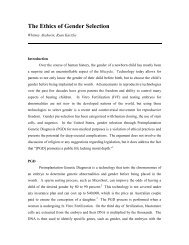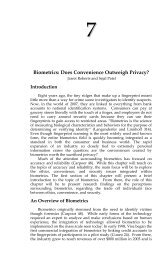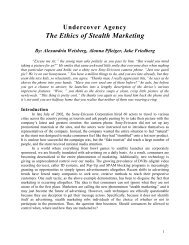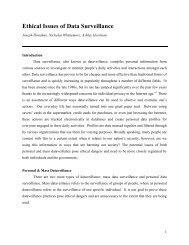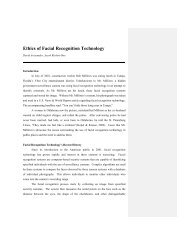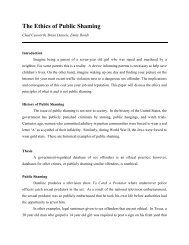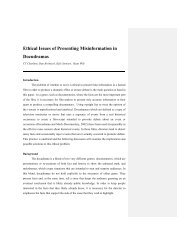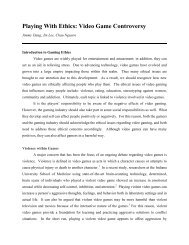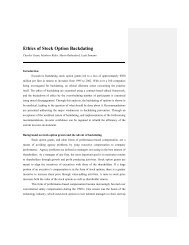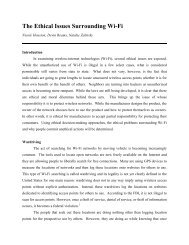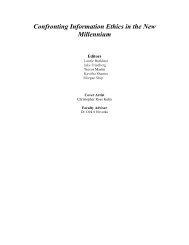Social Networking Privacy and Its Effects on Employment ...
Social Networking Privacy and Its Effects on Employment ...
Social Networking Privacy and Its Effects on Employment ...
Create successful ePaper yourself
Turn your PDF publications into a flip-book with our unique Google optimized e-Paper software.
12<br />
<str<strong>on</strong>g>Social</str<strong>on</strong>g> <str<strong>on</strong>g>Networking</str<strong>on</strong>g> <str<strong>on</strong>g>Privacy</str<strong>on</strong>g> <str<strong>on</strong>g>and</str<strong>on</strong>g> <str<strong>on</strong>g>Its</str<strong>on</strong>g> <str<strong>on</strong>g>Effects</str<strong>on</strong>g> <strong>on</strong><br />
<strong>Employment</strong> Opportunities<br />
Nicole Kennedy <str<strong>on</strong>g>and</str<strong>on</strong>g> Matt Macko<br />
Prologue to <str<strong>on</strong>g>Social</str<strong>on</strong>g> <str<strong>on</strong>g>Networking</str<strong>on</strong>g> Overview<br />
Imagine entering your final semester in college. Throughout the<br />
previous four years you have made it a goal to be involved with<br />
extracurricular activities at the university, to volunteer in the local<br />
community, to maintain a high grade point average <str<strong>on</strong>g>and</str<strong>on</strong>g> to receive<br />
recommendati<strong>on</strong> letters from several well-known professors at the<br />
university. You are ready for your first interview, <str<strong>on</strong>g>and</str<strong>on</strong>g> have no doubt<br />
that you can l<str<strong>on</strong>g>and</str<strong>on</strong>g> that dream job you have been working towards for<br />
the last four years. That is until the interviewer refers to direct quotes<br />
from your <strong>on</strong>line social network profile <str<strong>on</strong>g>and</str<strong>on</strong>g> begins asking about your<br />
listed interests such as partying, drinking with friends, going to bars,<br />
<str<strong>on</strong>g>and</str<strong>on</strong>g> even your political views. You begin to w<strong>on</strong>der if they can use this<br />
informati<strong>on</strong> against you, <str<strong>on</strong>g>and</str<strong>on</strong>g> ask yourself the questi<strong>on</strong>: when did my<br />
<strong>on</strong>line social life become a factor in my future professi<strong>on</strong>al life?<br />
Unfortunately, this situati<strong>on</strong> is not unrealistic. Currently, no<br />
regulati<strong>on</strong>s exist to protect job c<str<strong>on</strong>g>and</str<strong>on</strong>g>idates from harassment of this sort.<br />
Government agencies work to resolve <strong>on</strong> the job issues with regards to<br />
fair hiring practices but the U.S. does not regulate an employers’ search<br />
for incriminating informati<strong>on</strong>. This threat will remain a possibility as<br />
l<strong>on</strong>g as the world of social networking c<strong>on</strong>tinues to exp<str<strong>on</strong>g>and</str<strong>on</strong>g> <str<strong>on</strong>g>and</str<strong>on</strong>g> social<br />
profile privacy issues remain unresolved.<br />
Overview of <str<strong>on</strong>g>Social</str<strong>on</strong>g> <str<strong>on</strong>g>Networking</str<strong>on</strong>g><br />
<str<strong>on</strong>g>Social</str<strong>on</strong>g> networking <strong>on</strong> the Internet began with a desire for people to<br />
quickly <str<strong>on</strong>g>and</str<strong>on</strong>g> c<strong>on</strong>veniently share informati<strong>on</strong> with their friends <str<strong>on</strong>g>and</str<strong>on</strong>g><br />
family. This form of communicati<strong>on</strong> blossomed rapidly <str<strong>on</strong>g>and</str<strong>on</strong>g> started<br />
competing in popularity with e-mail <str<strong>on</strong>g>and</str<strong>on</strong>g> text messaging. Entrepreneurs<br />
harnessed this technology <str<strong>on</strong>g>and</str<strong>on</strong>g> created various Internet sites, including<br />
Facebook <str<strong>on</strong>g>and</str<strong>on</strong>g> MySpace, designed to allow users to create a profile<br />
c<strong>on</strong>taining informati<strong>on</strong> about themselves that others can view. These<br />
sites also allow users to build social networks with hundreds or even<br />
thous<str<strong>on</strong>g>and</str<strong>on</strong>g>s of people. Previously, the use of these websites posed little<br />
known threat to pers<strong>on</strong>al privacy <str<strong>on</strong>g>and</str<strong>on</strong>g> users’ comfort levels changed.
They started by displaying the necessary informati<strong>on</strong> to c<strong>on</strong>struct an<br />
<strong>on</strong>line pers<strong>on</strong>a. But the reality is, some informati<strong>on</strong> <strong>on</strong> these sites is<br />
very private <str<strong>on</strong>g>and</str<strong>on</strong>g> not something a pers<strong>on</strong> would share with their family<br />
at a reuni<strong>on</strong>, a stranger <strong>on</strong> the street, <str<strong>on</strong>g>and</str<strong>on</strong>g> certainly not with a<br />
professi<strong>on</strong>al hiring manager.<br />
As the world of social networking became more popular, Facebook<br />
increased the availability of its product, opening doors to new networks<br />
<str<strong>on</strong>g>and</str<strong>on</strong>g> members. What began with restricted access to students with valid<br />
university-issued e-mail addresses, spread to allow high school <str<strong>on</strong>g>and</str<strong>on</strong>g><br />
corporate networks as well as users without verified e-mail addresses.<br />
These users can create profiles, <str<strong>on</strong>g>and</str<strong>on</strong>g> gain access to informati<strong>on</strong> <strong>on</strong> other<br />
members of the site (Facebook Opens Site to Every<strong>on</strong>e). College-aged<br />
students are beginning to see the mistake of providing private<br />
informati<strong>on</strong> <strong>on</strong> the Internet as more employers gain access to Facebook<br />
<str<strong>on</strong>g>and</str<strong>on</strong>g> use the informati<strong>on</strong> they find as a factor in hiring decisi<strong>on</strong>s.<br />
According to a July 2006 survey by the U.S. Nati<strong>on</strong>al Associati<strong>on</strong> of<br />
Colleges <str<strong>on</strong>g>and</str<strong>on</strong>g> Employers, ‚27% of employers have Googled their job<br />
c<str<strong>on</strong>g>and</str<strong>on</strong>g>idates or checked their profiles <strong>on</strong> social networking sites‛<br />
(George). These privacy issues are important to c<strong>on</strong>sider when creating<br />
a profile <str<strong>on</strong>g>and</str<strong>on</strong>g> interviewing for jobs. This chapter will shed light into the<br />
questi<strong>on</strong>s: Is it ethical for employers to use social profile informati<strong>on</strong> as<br />
a factor in hiring decisi<strong>on</strong>s? Are they currently using this informati<strong>on</strong><br />
for decisi<strong>on</strong>-making? How do students feel about this ‚invasi<strong>on</strong> of<br />
privacy?‛ What is happening today <str<strong>on</strong>g>and</str<strong>on</strong>g> what does the future hold for<br />
the c<strong>on</strong>fidentiality of social networking?<br />
Facebook’s Claim to <str<strong>on</strong>g>Privacy</str<strong>on</strong>g> Security<br />
According to Facebook’s <str<strong>on</strong>g>Privacy</str<strong>on</strong>g> Policy:<br />
Facebook is about sharing informati<strong>on</strong> with others —<br />
friends <str<strong>on</strong>g>and</str<strong>on</strong>g> people in your networks — while providing you<br />
with c<strong>on</strong>trols that restrict other third parties from accessing<br />
your informati<strong>on</strong>. We allow you to choose the informati<strong>on</strong><br />
you provide to friends <str<strong>on</strong>g>and</str<strong>on</strong>g> networks through Facebook. Our<br />
network architecture <str<strong>on</strong>g>and</str<strong>on</strong>g> your privacy settings allow you to<br />
make informed choices about who has access to your<br />
informati<strong>on</strong>. We do not provide c<strong>on</strong>tact informati<strong>on</strong> to third<br />
party marketers without your permissi<strong>on</strong>. We share your<br />
informati<strong>on</strong> with third parties <strong>on</strong>ly in limited circumstances<br />
where we believe such sharing is 1) reas<strong>on</strong>ably necessary to<br />
offer the service, 2) legally required or, 3) permitted by you<br />
(Facebook).<br />
At first glance, this privacy policy appears all encompassing. It<br />
protects pers<strong>on</strong>al privacy rights, but under the auspices of the privacy<br />
clause listed <strong>on</strong> the Facebook website, the default account settings allow<br />
for any<strong>on</strong>e in a shared network to view a user’s entire profile. In<br />
c<strong>on</strong>juncti<strong>on</strong> with the use of the Facebook Development Platform, third<br />
parties who agree to abide by the Platform’s Terms of Service, including<br />
restricti<strong>on</strong>s <strong>on</strong> access, storage <str<strong>on</strong>g>and</str<strong>on</strong>g> use of such data, are given limited<br />
rights to view members’ pers<strong>on</strong>al informati<strong>on</strong>. ‚We have undertaken<br />
c<strong>on</strong>tractual <str<strong>on</strong>g>and</str<strong>on</strong>g> technical steps to restrict possible misuse of such<br />
informati<strong>on</strong> by such third parties, but of course cannot <str<strong>on</strong>g>and</str<strong>on</strong>g> do not
guarantee that all third parties will abide by such agreements‛<br />
(Facebook).<br />
Essentially Facebook states they will attempt to protect their user’s<br />
informati<strong>on</strong>, but do not guarantee protecti<strong>on</strong> <str<strong>on</strong>g>and</str<strong>on</strong>g> refuse to take<br />
resp<strong>on</strong>sibility for certain breaches of protecti<strong>on</strong>. ‚Dan Hornig, a senior<br />
recruiting manager for Novo Recruiting, spends more than <strong>on</strong>e-third of<br />
his day researching clients - <str<strong>on</strong>g>and</str<strong>on</strong>g> yes, that includes looking for<br />
informati<strong>on</strong> about them <strong>on</strong>line‛ (Lupsa). This recruiting manager is an<br />
example of the third party who agreed to the Facebook Development<br />
Platform terms of service <str<strong>on</strong>g>and</str<strong>on</strong>g> now accesses thous<str<strong>on</strong>g>and</str<strong>on</strong>g>s of college<br />
students’ social profiles using that informati<strong>on</strong> however he pleases. All<br />
the while, Facebook escapes resp<strong>on</strong>sibility. Several cases in the past few<br />
years dictate the lack of privacy encompassed by the Facebook <str<strong>on</strong>g>Privacy</str<strong>on</strong>g><br />
Policy.<br />
Previous Case Involving the Threat of <str<strong>on</strong>g>Social</str<strong>on</strong>g> <str<strong>on</strong>g>Networking</str<strong>on</strong>g><br />
Informati<strong>on</strong><br />
‚A survey by CareerBuilder.com found that <strong>on</strong>e in four hiring<br />
managers used search engines to screen c<str<strong>on</strong>g>and</str<strong>on</strong>g>idates. One in ten also<br />
checked c<str<strong>on</strong>g>and</str<strong>on</strong>g>idates' profiles <strong>on</strong> social networking sites such as MySpace<br />
or Facebook‛ (Lupsa). This is precisely what happened to an<br />
unsuspecting Louisiana State University student while interviewing for<br />
a job in 2006. He was a member of Facebook for over two years <str<strong>on</strong>g>and</str<strong>on</strong>g><br />
maintained an ‚all-inclusive‛ <strong>on</strong>line profile with pictures, quotes, <str<strong>on</strong>g>and</str<strong>on</strong>g><br />
more. While interviewing for internship positi<strong>on</strong>s, he followed the<br />
advice of his mother as well as school advisors choosing to make his<br />
profile ‚private,‛ so <strong>on</strong>ly his friends could see his informati<strong>on</strong>; or so he<br />
thought. Surprisingly, this security measure was not enough to protect<br />
his informati<strong>on</strong> from discovery.<br />
During the interview, something he was not prepared<br />
for happened. The interviewer began asking specific<br />
questi<strong>on</strong>s about the c<strong>on</strong>tent <strong>on</strong> his Facebook.com listing <str<strong>on</strong>g>and</str<strong>on</strong>g><br />
the situati<strong>on</strong> became very awkward <str<strong>on</strong>g>and</str<strong>on</strong>g> uncomfortable. The<br />
student had thought that <strong>on</strong>ly those he allowed to access his<br />
profile would be able to do so. The interviewer explained<br />
that as a state agency, recruiters accessed his Facebook<br />
account under the auspices of the Patriot Act (LSUS Career<br />
Services).<br />
This is <strong>on</strong>e example of the unpredictability of current privacy<br />
c<strong>on</strong>trols <str<strong>on</strong>g>and</str<strong>on</strong>g> the misc<strong>on</strong>cepti<strong>on</strong> that <strong>on</strong>ly a member’s friends can see<br />
their profile when they select ‚private‛ <strong>on</strong> Facebook. The c<strong>on</strong>sequences<br />
shocked the student. A seemingly innocent social networking site<br />
crushed his chances for the job <str<strong>on</strong>g>and</str<strong>on</strong>g> the company disappointed him with<br />
how far they went to unearth his private informati<strong>on</strong>. Extreme as this<br />
case may be, it accurately depicts privacy issues presented with social<br />
networking <strong>on</strong> the World Wide Web.<br />
The Ethics Related to <str<strong>on</strong>g>Social</str<strong>on</strong>g> <str<strong>on</strong>g>Networking</str<strong>on</strong>g> <str<strong>on</strong>g>Privacy</str<strong>on</strong>g>:<br />
The general definiti<strong>on</strong> of ethics is ‚a system of moral principles<br />
governing the appropriate c<strong>on</strong>duct for an individual or group‛ (Encarta
Dicti<strong>on</strong>ary). How does this theory of ethics apply to the study of social<br />
networks <str<strong>on</strong>g>and</str<strong>on</strong>g> employers’ use of them? Research of peoples’ opini<strong>on</strong>s<br />
<strong>on</strong> the ethics of employers using <strong>on</strong>line informati<strong>on</strong>, especially that<br />
stemming from social profiles in a hiring or recruiting decisi<strong>on</strong>, shows<br />
c<strong>on</strong>tinued c<strong>on</strong>troversy over this highly debatable topic. Current<br />
research finds <strong>on</strong>e-third of students feel the practice of Facebook<br />
research is ‚unethical‛ (George). Students’ worry employers will take<br />
informati<strong>on</strong> out of c<strong>on</strong>text <str<strong>on</strong>g>and</str<strong>on</strong>g> the purpose or rati<strong>on</strong>ale behind their<br />
social profiles will be misunderstood. In further research, ‚42% of<br />
students said that for companies to make hiring decisi<strong>on</strong>s using<br />
Facebook is a violati<strong>on</strong> of privacy < whereas < <strong>on</strong>ly 21% of employers<br />
thought the same‛ (George). According to Philadelphia attorney<br />
J<strong>on</strong>athan Segal, ‚the questi<strong>on</strong> is what employers do with the<br />
informati<strong>on</strong> they find <strong>on</strong> the Internet,‛ (Segal). Clearly differences in<br />
opini<strong>on</strong> exist, but where should society draw the line between employer<br />
due diligence <str<strong>on</strong>g>and</str<strong>on</strong>g> applicant/prospective employee privacy?<br />
Why Employers Are Researching Job C<str<strong>on</strong>g>and</str<strong>on</strong>g>idates Online<br />
Due diligence is defined as ‚the degree of care that a prudent<br />
pers<strong>on</strong> would exercise, <str<strong>on</strong>g>and</str<strong>on</strong>g> a legally relevant st<str<strong>on</strong>g>and</str<strong>on</strong>g>ard for establishing<br />
liability‛ (Encarta Dicti<strong>on</strong>ary). Insurance companies c<strong>on</strong>duct extensive<br />
research compiling informati<strong>on</strong> to value a policy <str<strong>on</strong>g>and</str<strong>on</strong>g> the inherent risks<br />
of a client. Companies now initiate the same techniques with<br />
background checks in an effort to acquire outside informati<strong>on</strong> regarding<br />
potential job c<str<strong>on</strong>g>and</str<strong>on</strong>g>idates. Companies perform these necessary tasks to<br />
protect themselves <str<strong>on</strong>g>and</str<strong>on</strong>g> their organizati<strong>on</strong> by mitigating risks through<br />
due diligence <str<strong>on</strong>g>and</str<strong>on</strong>g> exercising a distinguished degree of care when<br />
evaluating job c<str<strong>on</strong>g>and</str<strong>on</strong>g>idates <str<strong>on</strong>g>and</str<strong>on</strong>g> clients.<br />
Is it reas<strong>on</strong>able to expect a corporati<strong>on</strong> not to c<strong>on</strong>duct proper<br />
background checks <strong>on</strong> job applicants? They limit their liability of<br />
choosing the wr<strong>on</strong>g c<str<strong>on</strong>g>and</str<strong>on</strong>g>idate <str<strong>on</strong>g>and</str<strong>on</strong>g> the majority of people agree to a<br />
background check when requested during the job applicati<strong>on</strong> process.<br />
Can students <str<strong>on</strong>g>and</str<strong>on</strong>g> future professi<strong>on</strong>als expect prospective companies to<br />
disregard informati<strong>on</strong> they willingly place <strong>on</strong> the Internet when being<br />
evaluated for possible careers <str<strong>on</strong>g>and</str<strong>on</strong>g> c<strong>on</strong>siderable resp<strong>on</strong>sibility within the<br />
company? Countless companies argue they simply perform due<br />
diligence when evaluating applicants based <strong>on</strong> pers<strong>on</strong>al informati<strong>on</strong>,<br />
including that found within their <strong>on</strong>line social profiles. Others agree,<br />
believing people who voluntarily <str<strong>on</strong>g>and</str<strong>on</strong>g> knowingly place private <str<strong>on</strong>g>and</str<strong>on</strong>g><br />
pers<strong>on</strong>al informati<strong>on</strong> <strong>on</strong> public networking sites should recognize the<br />
likelihood employers will access the informati<strong>on</strong> <str<strong>on</strong>g>and</str<strong>on</strong>g> use it to their<br />
discreti<strong>on</strong>.<br />
Chris Wiley, the study’s other author, predicts that the debate over<br />
the increasingly blurred line between pers<strong>on</strong>al <str<strong>on</strong>g>and</str<strong>on</strong>g> professi<strong>on</strong>al life <strong>on</strong><br />
the Web will eventually be settled in the legal system: Facebook is just a<br />
small part of the bigger issue of privacy <strong>on</strong> the internet. In the<br />
meantime, until members of the Facebook generati<strong>on</strong> become bosses,<br />
keep your profile private, or d<strong>on</strong>'t put anything <strong>on</strong> there that you<br />
wouldn't want your mom to see (George 2007).<br />
Keeping <strong>on</strong>e's profile completely private may seem unnecessary,<br />
but as the informati<strong>on</strong> revoluti<strong>on</strong> progresses, <str<strong>on</strong>g>and</str<strong>on</strong>g> privacy becomes<br />
increasingly more important, private profiles may be the <strong>on</strong>ly safety net<br />
available to the next generati<strong>on</strong> of social networking clientele. In order
to determine the use of this "privacy" functi<strong>on</strong> am<strong>on</strong>g current business<br />
students, the following research was c<strong>on</strong>ducted.<br />
Survey <str<strong>on</strong>g>and</str<strong>on</strong>g> Statistical Research<br />
This chapter’s research looked to discover differences in students'<br />
as well as employers' opini<strong>on</strong>s regarding <strong>on</strong>line profile privacy. The<br />
student surveys asked questi<strong>on</strong>s to see what students felt was<br />
important to their privacy in regards to social networks as well as what<br />
they thought might affect them in a hiring decisi<strong>on</strong>. The employer<br />
surveys were very similar <str<strong>on</strong>g>and</str<strong>on</strong>g> were used to compare differences in<br />
student <str<strong>on</strong>g>and</str<strong>on</strong>g> employer opini<strong>on</strong>s regarding social network privacy. The<br />
goal was to discover whether a difference exists in these opini<strong>on</strong>s<br />
between male <str<strong>on</strong>g>and</str<strong>on</strong>g> female students, as well as any differences between<br />
students <str<strong>on</strong>g>and</str<strong>on</strong>g> employers. In the quest for employer diversity, opini<strong>on</strong>s<br />
were sought from human resource departments at an engineering firm,<br />
several accounting firms, as well as a local bank. The surveys were<br />
distributed <str<strong>on</strong>g>and</str<strong>on</strong>g> returned by over 100 students <str<strong>on</strong>g>and</str<strong>on</strong>g> 14 employers before<br />
data analysis began.<br />
The survey data was compiled <str<strong>on</strong>g>and</str<strong>on</strong>g> analyzed by employing several<br />
techniques to determine if the results were indicative of the general<br />
business student populati<strong>on</strong>. Due to the nature of the survey questi<strong>on</strong>s,<br />
median testing was required to properly examine the data. This is the<br />
result of using a small number of discrete variables (1-10: str<strong>on</strong>gly<br />
disagree - str<strong>on</strong>gly agree) as opposed to a c<strong>on</strong>tinuous number format.<br />
The Mann-Whitney Test was employed, which specifically tests<br />
medians <str<strong>on</strong>g>and</str<strong>on</strong>g> assumes equal variances between numbers, <str<strong>on</strong>g>and</str<strong>on</strong>g> can be<br />
used where normality in data is not required; all of which pertained to<br />
the collected data. "The Mann-Whitney Test is a n<strong>on</strong>parametric test to<br />
compare two populati<strong>on</strong>s, utilizing <strong>on</strong>ly the ranks of the data from two<br />
independent samples" (Seward 706). A hypothesis test was also applied<br />
to compare two proporti<strong>on</strong>s. "A hypothesis test is a decisi<strong>on</strong> between<br />
two competing, mutually exclusive, <str<strong>on</strong>g>and</str<strong>on</strong>g> collectively exhaustive<br />
hypotheses about the value of a populati<strong>on</strong> parameter" (Seward 350).<br />
This test was primarily used to compare the original pre-c<strong>on</strong>ceived<br />
noti<strong>on</strong>s (null hypotheses) of the business student <str<strong>on</strong>g>and</str<strong>on</strong>g> employer<br />
populati<strong>on</strong> with survey sample results. These tests helped gain insight<br />
into how the business student populati<strong>on</strong> feels about their social<br />
network privacy as well as into how employers feel about this relatively<br />
new <str<strong>on</strong>g>and</str<strong>on</strong>g> powerful tool.<br />
Survey <str<strong>on</strong>g>and</str<strong>on</strong>g> Statistical Research Results<br />
The analytical research results c<strong>on</strong>firmed several pre-c<strong>on</strong>ceived<br />
noti<strong>on</strong>s regarding opini<strong>on</strong>s <strong>on</strong> social network privacy, but also proved<br />
interesting in various unexpected facets. The Mann-Whitney Test was<br />
applied assuming women would rank a majority of the following:<br />
address, ph<strong>on</strong>e number, e-mail address, birth date, relati<strong>on</strong>ship status,<br />
class schedule, etc., as being more important to their pers<strong>on</strong>al privacy<br />
than men. The test showed a significant difference between women <str<strong>on</strong>g>and</str<strong>on</strong>g><br />
men across the populati<strong>on</strong> for informati<strong>on</strong> such as address, ph<strong>on</strong>e, email<br />
address, current employment, <str<strong>on</strong>g>and</str<strong>on</strong>g> class schedule, each having Pvalues<br />
of .05 or lower. This means female business students rank this<br />
informati<strong>on</strong> as more important to their pers<strong>on</strong>al privacy than male
students, which c<strong>on</strong>firmed expectati<strong>on</strong>s.<br />
A hypothesis test then determined whether there was a difference<br />
in the populati<strong>on</strong> of men <str<strong>on</strong>g>and</str<strong>on</strong>g> women business students with regards to<br />
their profiles being classified as private. The null hypothesis stated that<br />
the proporti<strong>on</strong> of women with private profiles was equal to the<br />
proporti<strong>on</strong> of men with private profiles. This analysis went against<br />
previous assumpti<strong>on</strong>s that more women would have private profiles<br />
than men, thus a <strong>on</strong>e-tailed test of the alternative hypothesis was used<br />
for verificati<strong>on</strong> of these results. The <strong>on</strong>e-tailed hypothesis test resulted<br />
in a P-value of .04, which signifies a substantially greater proporti<strong>on</strong> of<br />
women business students than men business students who have made<br />
their profiles private.<br />
Earlier literature research quoted, "42% of students said that for<br />
companies to make hiring decisi<strong>on</strong>s using Facebook is a violati<strong>on</strong> of<br />
privacy < whereas < <strong>on</strong>ly 21% of employers thought the same"<br />
(George), which set expectati<strong>on</strong>s for various survey outcomes, yet<br />
further analysis yielded surprising results. 41% of the 100 students<br />
surveyed actually found it ethical for employers to use social<br />
networking sites in hiring decisi<strong>on</strong>s, <str<strong>on</strong>g>and</str<strong>on</strong>g> 57% of employers thought the<br />
same. Further analysis using a hypothesis test determined the difference<br />
between men <str<strong>on</strong>g>and</str<strong>on</strong>g> women’s feelings regarding the ethics of social<br />
networking privacy in hiring situati<strong>on</strong>s. Resp<strong>on</strong>dents were asked, "Do<br />
you think it is ethical for hiring managers to use informati<strong>on</strong> obtained<br />
from your social profile when making hiring decisi<strong>on</strong>s?" A two-tailed<br />
hypothesis test resulted in a P-value of .63, <str<strong>on</strong>g>and</str<strong>on</strong>g> produced the null<br />
hypothesis that women <str<strong>on</strong>g>and</str<strong>on</strong>g> men feel the same in regards to the ethics of<br />
using social networking sites in the hiring process. The survey data did<br />
not show a statistical difference between men <str<strong>on</strong>g>and</str<strong>on</strong>g> women’s feelings <strong>on</strong><br />
ethics across the populati<strong>on</strong> of business students, so a rejecti<strong>on</strong> of the<br />
null hypothesis failed. These sample results were surprising based <strong>on</strong><br />
previous expectati<strong>on</strong>s that a difference would exist. Yet, it remained to<br />
be determined whether there existed a variati<strong>on</strong> in opini<strong>on</strong>s between<br />
students <str<strong>on</strong>g>and</str<strong>on</strong>g> employers.
Based <strong>on</strong> previous literature review, a greater percentage of<br />
employers view the use of social network sites in the hiring process as<br />
an ethical practice. Due to this original hypothesis a <strong>on</strong>e-tailed test was<br />
used to determine if surveyed employers would agree, <str<strong>on</strong>g>and</str<strong>on</strong>g> resulted in<br />
Percent<br />
40<br />
35<br />
30<br />
25<br />
20<br />
15<br />
10<br />
5<br />
0<br />
40<br />
35<br />
30<br />
25<br />
20<br />
15<br />
10<br />
5<br />
0<br />
Histogram of Student Resp<strong>on</strong>se to: I feel "pictures of me<br />
drinking alcohol" would impact a hiring manager to hire me<br />
1 2 3 4 5 6 7 8 9 10<br />
str<strong>on</strong>gly dis-agree<br />
Resp<strong>on</strong>se<br />
str<strong>on</strong>gly agree<br />
the P-value of .16. This P-value was not small enough to c<strong>on</strong>clude that<br />
employers <str<strong>on</strong>g>and</str<strong>on</strong>g> students feel differently regarding the ethics of using<br />
social network sites for hiring decisi<strong>on</strong>s. In fact, several prior theories<br />
regarding differences between student <str<strong>on</strong>g>and</str<strong>on</strong>g> employer opini<strong>on</strong>s proved<br />
inaccurate. Below are two histograms showing this unexpected<br />
difference:<br />
Percent<br />
Histogram of Employer Resp<strong>on</strong>se to: I feel pictures of a<br />
recent graduate or applicant drinking would impact my<br />
decisi<strong>on</strong> to hire them<br />
1 2 3 4 5 6 7 8 9 10<br />
str<strong>on</strong>gly dis-agree<br />
Resp<strong>on</strong>se<br />
str<strong>on</strong>gly agree<br />
Surprisingly, students were more apprehensive about an<br />
employers’ viewing pictures of them drinking than the employers<br />
surveyed, who in the majority gave a nearly neutral answer <strong>on</strong> the<br />
topic. Although the employer sample was small, the results are
unanimous: employers ranked <strong>on</strong>line pictures <str<strong>on</strong>g>and</str<strong>on</strong>g> videos, drinking <str<strong>on</strong>g>and</str<strong>on</strong>g><br />
drug paraphernalia pictures, promiscuous behavior pictures, etc., all at<br />
a lower importance than students. These results were the most<br />
ast<strong>on</strong>ishing.<br />
This survey data gathered provides insight into the differences in<br />
opini<strong>on</strong> regarding social network site privacy issues, but certainly does<br />
not give a comprehensive picture. Time c<strong>on</strong>straints limited the extent of<br />
analysis of the survey data collected. Finding correlati<strong>on</strong>s as well as<br />
statistical comparis<strong>on</strong>s between categories <str<strong>on</strong>g>and</str<strong>on</strong>g> between classes<br />
(Freshman, Sophomore, Junior, Senior) would be the next step. The<br />
Kruskal-Wallis test is recommended for this research as it compares the<br />
populati<strong>on</strong> medians across multiple categories. In additi<strong>on</strong>, the limited<br />
amount of employer resp<strong>on</strong>dents was a restricti<strong>on</strong> <strong>on</strong> c<strong>on</strong>clusive<br />
decisi<strong>on</strong>s <str<strong>on</strong>g>and</str<strong>on</strong>g> broadened the possibility of error in statistical results.<br />
The students surveyed c<strong>on</strong>sisted primarily of a broad populati<strong>on</strong> within<br />
the Leeds School of Business, <str<strong>on</strong>g>and</str<strong>on</strong>g> do not accurately depict the opini<strong>on</strong>s<br />
of the University of Colorado or scholastic instituti<strong>on</strong>s as a whole.<br />
Student opini<strong>on</strong>s from the Leeds School of Business may have been<br />
altered by classes teaching privacy issues, or from their predispositi<strong>on</strong>s<br />
regarding business ethics. Tailoring the survey to include a more<br />
diverse student sample, acquiring data from more employers, <str<strong>on</strong>g>and</str<strong>on</strong>g><br />
deciphering the data with a c<strong>on</strong>tinuous number format to allow more<br />
statistical analysis would yield more accurate results for future research.<br />
Until that time, it is necessary to explore the current state of affairs<br />
regarding these rising privacy issues.<br />
What is Being D<strong>on</strong>e: The Present<br />
To resolve these c<strong>on</strong>cerns, laws need to be enacted to protect the<br />
respective parties <str<strong>on</strong>g>and</str<strong>on</strong>g> regulate the use of the wealth of <strong>on</strong>line social<br />
networking informati<strong>on</strong>. The decisi<strong>on</strong> to either empower employers by<br />
allowing them to use all public Internet informati<strong>on</strong> in hiring decisi<strong>on</strong>s,<br />
or to protect potential employees by restricting the informati<strong>on</strong><br />
employers are legally able to use, is imminent in the U.S. However, as<br />
of March 2007, no evidence of lawsuits or legal acti<strong>on</strong>s against a<br />
company that used public Internet informati<strong>on</strong> against a job applicant<br />
exists.<br />
Very few laws protect applicants <str<strong>on</strong>g>and</str<strong>on</strong>g> currently we found virtually<br />
no statutes in place to restrict discriminatory Internet practices. With<br />
the recent escalati<strong>on</strong> in the importance of this topic within corporate<br />
America <str<strong>on</strong>g>and</str<strong>on</strong>g> the news, lawmakers may be forced to address this<br />
c<strong>on</strong>troversial issue so<strong>on</strong>er rather than later. With the abundance of<br />
public informati<strong>on</strong> pouring <strong>on</strong>to the Internet, laws will be necessary to<br />
protect applicants in the future.<br />
New York currently protects applicants by prohibiting employers<br />
from ‚taking adverse acti<strong>on</strong> against employees’ off-duty, political, or<br />
uni<strong>on</strong> activities <str<strong>on</strong>g>and</str<strong>on</strong>g> recreati<strong>on</strong>al activities" (Segal). This is by no means<br />
a universal law, nor does it protect employees from persecuti<strong>on</strong> during<br />
the recruitment process; however, it does address a critical issue: the<br />
importance of distinguishing work life from an employees’ social life<br />
outside of work. The questi<strong>on</strong> is whether what <strong>on</strong>e chooses to do<br />
outside the office should be their private business. Employees tend to<br />
characterize their company both at work <str<strong>on</strong>g>and</str<strong>on</strong>g> at home. Upper level
management is certainly expected to maintain a representati<strong>on</strong>al<br />
resp<strong>on</strong>sibility to their company:<br />
David Perry, an executive recruiter, says a c<str<strong>on</strong>g>and</str<strong>on</strong>g>idate to become<br />
a chief financial officer was found to have a gambling problem.<br />
We actually found it out <str<strong>on</strong>g>and</str<strong>on</strong>g> tracked his profile back to an<br />
<strong>on</strong>line gambling site <strong>on</strong> the Web. Now, you have to ask<br />
yourself, what's that got to do with his job? Well nothing,<br />
probably. But this is a multibilli<strong>on</strong>-dollar corporati<strong>on</strong> that we<br />
were putting a chief financial officer into <str<strong>on</strong>g>and</str<strong>on</strong>g> we just didn't<br />
think it was appropriate (NPR).<br />
Where should the line be drawn? Laws will be necessary to<br />
determine whether due diligence background research should stop at<br />
mid-level management or c<strong>on</strong>tinue all the way down to the mailroom<br />
employees, as is possible today.<br />
Finl<str<strong>on</strong>g>and</str<strong>on</strong>g> is currently the <strong>on</strong>ly country progressively h<str<strong>on</strong>g>and</str<strong>on</strong>g>ling these<br />
Internet privacy issues in a c<strong>on</strong>crete way by passing nati<strong>on</strong>ally<br />
recognized regulati<strong>on</strong>s.<br />
Finl<str<strong>on</strong>g>and</str<strong>on</strong>g>’s Data Protecti<strong>on</strong> Ombudsman ruled in a November<br />
decisi<strong>on</strong> that employers cannot use Internet search engines, such<br />
as Google, to obtain background informati<strong>on</strong> <strong>on</strong> job c<str<strong>on</strong>g>and</str<strong>on</strong>g>idates.<br />
Ombudsman Reijo Aarnio told BNA the decisi<strong>on</strong> was clear-cut.<br />
‘According to the *<str<strong>on</strong>g>Privacy</str<strong>on</strong>g> in Working Life Act+, employers can<br />
<strong>on</strong>ly view pers<strong>on</strong>al data provided by their employees, <str<strong>on</strong>g>and</str<strong>on</strong>g> this<br />
includes data about job applicants’. He c<strong>on</strong>tinues saying ‘the act<br />
is based <strong>on</strong> the idea that every<strong>on</strong>e is in agreement <strong>on</strong> the kind of<br />
data collected’ (Segal).<br />
From an employee’s st<str<strong>on</strong>g>and</str<strong>on</strong>g>point, it may be a relief to see countries<br />
taking acti<strong>on</strong> to protect their individual privacy rights; however, an<br />
entirely different issue regarding the feasibility of m<strong>on</strong>itoring <str<strong>on</strong>g>and</str<strong>on</strong>g><br />
enforcing these laws will arise in the aftermath of their creati<strong>on</strong>. What<br />
policies could stop an employer from searching possible c<str<strong>on</strong>g>and</str<strong>on</strong>g>idates <strong>on</strong><br />
the Internet, <str<strong>on</strong>g>and</str<strong>on</strong>g> who would enforce such c<strong>on</strong>venti<strong>on</strong>s? When will laws<br />
govern these unique situati<strong>on</strong>s? Based <strong>on</strong> current U.S. regulati<strong>on</strong>s, the<br />
Equal <strong>Employment</strong> Opportunity Commissi<strong>on</strong> could become that<br />
governing agency.<br />
Equal <strong>Employment</strong> Opportunity Commissi<strong>on</strong><br />
Currently, the Equal <strong>Employment</strong> Opportunity Commissi<strong>on</strong><br />
(EEOC) protects employees from discriminati<strong>on</strong>.<br />
The Equal <strong>Employment</strong> Opportunity Commissi<strong>on</strong> is an<br />
independent federal agency created by C<strong>on</strong>gress in 1964 to<br />
eradicate discriminati<strong>on</strong> in employment. The various statutes<br />
enforced by the Commissi<strong>on</strong> prohibit employment<br />
discriminati<strong>on</strong> <strong>on</strong> the basis of race, color, sex, nati<strong>on</strong>al origin,<br />
religi<strong>on</strong>, retaliati<strong>on</strong>, age <str<strong>on</strong>g>and</str<strong>on</strong>g> disability (EEOC).<br />
This commissi<strong>on</strong> protects employees from discriminati<strong>on</strong> in the<br />
interview process, employment process, <str<strong>on</strong>g>and</str<strong>on</strong>g> the firing or lay-off
process; however, finds difficulty regulating the pre-interview process.<br />
Below is a fictitious example of how the Internet <str<strong>on</strong>g>and</str<strong>on</strong>g> social networking<br />
sites may adversely affect an applicant.<br />
A professi<strong>on</strong>al hiring manager is prejudiced to certain pers<strong>on</strong>al<br />
characteristics. He keeps his views secret within the workplace, but<br />
exercises these beliefs <strong>on</strong> a daily basis while reviewing <str<strong>on</strong>g>and</str<strong>on</strong>g> searching<br />
applicants’ pers<strong>on</strong>al informati<strong>on</strong> <strong>on</strong> the Internet. Up<strong>on</strong> discovering<br />
c<strong>on</strong>flicting informati<strong>on</strong> regarding the applicants’ religi<strong>on</strong>, racial<br />
preferences, or nati<strong>on</strong>al origin, he simply disregards their résume. To<br />
avoid prosecuti<strong>on</strong>, he claims he never received the résume. This<br />
employer undeniably uses the Internet in a discriminatory way <str<strong>on</strong>g>and</str<strong>on</strong>g> it is<br />
likely these practices will not be discovered nor will he see legal acti<strong>on</strong><br />
under the current set of laws governing hiring practices. To illustrate<br />
the purpose of this example <str<strong>on</strong>g>and</str<strong>on</strong>g> to underst<str<strong>on</strong>g>and</str<strong>on</strong>g> its high likelihood,<br />
c<strong>on</strong>sider the following interview with Steven Viscussi explains:<br />
Interviewer: Does that mean the employer might find out about<br />
things they could not ask about in a job interview?<br />
Steven Viscusi: Absolutely, like your sexuality, which is often <strong>on</strong><br />
MySpace or Friendster C<strong>on</strong>necti<strong>on</strong>. They can find out<br />
about how many kids you have, your family, who<br />
your looking for, even what your habits are. <str<strong>on</strong>g>and</str<strong>on</strong>g> by<br />
the way, its no l<strong>on</strong>ger a chance that they might find<br />
out, many human resources departments are actively<br />
pursuing these sites to find out all the questi<strong>on</strong>s that<br />
they can't legally ask you (NPR).<br />
Hiring departments use the Internet to their discreti<strong>on</strong> in order to<br />
narrow the applicant field without seeing repercussi<strong>on</strong>s from the EEOC.<br />
"Some employers worry that because of the access it gives them to<br />
informati<strong>on</strong> <strong>on</strong> race, sexuality, or religious affiliati<strong>on</strong>, using Facebook as<br />
a hiring tool may be in violati<strong>on</strong> of equal opportunity st<str<strong>on</strong>g>and</str<strong>on</strong>g>ards"<br />
(George). As l<strong>on</strong>g as this prejudiced screening process occurs before the<br />
interview, there is little an applicant can do to argue they should have<br />
been hired. While no litigati<strong>on</strong>s attributable to these laws <str<strong>on</strong>g>and</str<strong>on</strong>g><br />
regulati<strong>on</strong>s currently exist, the c<strong>on</strong>troversy surrounding privacy <str<strong>on</strong>g>and</str<strong>on</strong>g><br />
the Internet will press courts to address these issues.<br />
Fair Credit Reporting Act<br />
The Fair Credit Reporting Act <str<strong>on</strong>g>and</str<strong>on</strong>g> Accurate Credit Transacti<strong>on</strong>s<br />
Act of 2003 (FCRA) regulates third party background screening<br />
agencies who c<strong>on</strong>duct comprehensive pre-employment screening,<br />
criminal searches <str<strong>on</strong>g>and</str<strong>on</strong>g> background checks for various corporate clients.<br />
Companies specifically c<strong>on</strong>tract these agencies to search for <str<strong>on</strong>g>and</str<strong>on</strong>g> scour<br />
informati<strong>on</strong> <strong>on</strong> employees, possible insurance policy purchasers, <str<strong>on</strong>g>and</str<strong>on</strong>g> an<br />
assortment of potential c<strong>on</strong>sumers of numerous industries. The FCRA<br />
defines a c<strong>on</strong>sumer report as:<br />
Any written, oral or other communicati<strong>on</strong> of any informati<strong>on</strong> by<br />
a c<strong>on</strong>sumer reporting agency bearing <strong>on</strong> a c<strong>on</strong>sumer’s credit<br />
worthiness, credit st<str<strong>on</strong>g>and</str<strong>on</strong>g>ing, credit capacity, character, general<br />
reputati<strong>on</strong>, pers<strong>on</strong>al characteristics or mode of living, which is<br />
used or collected in whole or part for the purpose of serving as a
factor in establishing the c<strong>on</strong>sumer’s eligibility for credit or<br />
insurance to be used primarily for pers<strong>on</strong>al, family or household<br />
purposes; employment purposes; or any other permissible<br />
purpose authorized under 1681b (Sotto 3).<br />
Invariably, these third party background screeners also use the<br />
Internet in their extensive searches. If screening firms find negative<br />
informati<strong>on</strong> <strong>on</strong> a c<str<strong>on</strong>g>and</str<strong>on</strong>g>idate, federal law requires them to notify the<br />
c<str<strong>on</strong>g>and</str<strong>on</strong>g>idate as well as establish a procedure to verify the informati<strong>on</strong> is<br />
current <str<strong>on</strong>g>and</str<strong>on</strong>g> accurate. Unfortunately, these regulated procedures are not<br />
always followed. Tena Friery, research director at the n<strong>on</strong>profit<br />
c<strong>on</strong>sumer organizati<strong>on</strong> <str<strong>on</strong>g>Privacy</str<strong>on</strong>g> Rights Clearinghouse in San Diego,<br />
said, ‚screeners often turn up err<strong>on</strong>eous informati<strong>on</strong> by failing to<br />
properly match key ‘data points,’ such as first, middle, <str<strong>on</strong>g>and</str<strong>on</strong>g> last names;<br />
previous names; <str<strong>on</strong>g>Social</str<strong>on</strong>g> Security numbers; date <str<strong>on</strong>g>and</str<strong>on</strong>g> place of birth; <str<strong>on</strong>g>and</str<strong>on</strong>g><br />
previous addresses‛ (Sotto 3). These laws <str<strong>on</strong>g>and</str<strong>on</strong>g> regulati<strong>on</strong>s cover <strong>on</strong>ly a<br />
porti<strong>on</strong> of the issues currently c<strong>on</strong>fr<strong>on</strong>ted in new ‚ordinary‛ hiring<br />
practices, <str<strong>on</strong>g>and</str<strong>on</strong>g> the future is guaranteed to bring new opini<strong>on</strong>s <str<strong>on</strong>g>and</str<strong>on</strong>g><br />
regulati<strong>on</strong>s regarding these c<strong>on</strong>cerns.<br />
What the Future Holds<br />
If reputati<strong>on</strong> protecti<strong>on</strong> is a c<strong>on</strong>cern, Claimid.com <str<strong>on</strong>g>and</str<strong>on</strong>g> a host of<br />
other Internet sites assist in this process. Fred Stutzman <str<strong>on</strong>g>and</str<strong>on</strong>g> Terrel<br />
Russell organized an <strong>on</strong>line service to help people track, verify,<br />
annotate, <str<strong>on</strong>g>and</str<strong>on</strong>g> prioritize pers<strong>on</strong>al <strong>on</strong>line informati<strong>on</strong>. The goal of the<br />
service is to provide a representative depicti<strong>on</strong> of yourself when you are<br />
searched <strong>on</strong>line (George 2). Other companies such as Naymz <str<strong>on</strong>g>and</str<strong>on</strong>g><br />
Reputati<strong>on</strong>Defender.com exist for the same purpose. For a small fee<br />
starting at about $5 a m<strong>on</strong>th, these sites m<strong>on</strong>itor <strong>on</strong>line profiles as well<br />
as provide the necessary tools to protect reputati<strong>on</strong>s <str<strong>on</strong>g>and</str<strong>on</strong>g> the<br />
accessibility of any negative informati<strong>on</strong>.<br />
The goal for many of these sites is search engine flooding, which<br />
pushes negative press to the sec<strong>on</strong>d <str<strong>on</strong>g>and</str<strong>on</strong>g> third pages of a search where<br />
the likelihood of its discovery drastically decreases. They also have the<br />
ability to c<strong>on</strong>tact the site administrator where they lobby <strong>on</strong> your behalf<br />
to remove any informati<strong>on</strong> you choose, especially useful when<br />
disputing the accuracy of informati<strong>on</strong>. Reputati<strong>on</strong>Defender.com's motto<br />
is ‚search <str<strong>on</strong>g>and</str<strong>on</strong>g> destroy.‛<br />
For a small fee, Michael Fertik (Reputati<strong>on</strong>Defender.com’s creator)<br />
digs through clients' Internet profiles <str<strong>on</strong>g>and</str<strong>on</strong>g> then shows them how they<br />
appear <strong>on</strong>line. If clients see something they do not like,<br />
Reputati<strong>on</strong>Defender will c<strong>on</strong>tact whoever c<strong>on</strong>trols the Web page <str<strong>on</strong>g>and</str<strong>on</strong>g><br />
urge them to delete the material. If they resist, Fertik -- a Harvard law<br />
graduate -- says his company is ready to use attorneys (NPR).<br />
Services such as Reputati<strong>on</strong>Defender.com provide a public<br />
relati<strong>on</strong>s service to the layman. These sites grow in popularity daily but<br />
are still underused <str<strong>on</strong>g>and</str<strong>on</strong>g> underappreciated. "Perry (creator of Naymz)<br />
says that with so many recruiters vetting people <strong>on</strong> the Internet, job<br />
c<str<strong>on</strong>g>and</str<strong>on</strong>g>idates either need to background themselves or hire some<strong>on</strong>e else<br />
to do it for them" (NPR). The reality is that more <str<strong>on</strong>g>and</str<strong>on</strong>g> more employers<br />
search the Web <str<strong>on</strong>g>and</str<strong>on</strong>g> social network sites everyday. Students <str<strong>on</strong>g>and</str<strong>on</strong>g> job<br />
c<str<strong>on</strong>g>and</str<strong>on</strong>g>idates need to protect themselves whenever possible <str<strong>on</strong>g>and</str<strong>on</strong>g> should
c<strong>on</strong>sider using <strong>on</strong>e of the aforementi<strong>on</strong>ed sites or protect themselves by<br />
maintaining a private <str<strong>on</strong>g>and</str<strong>on</strong>g> ‚clean‛ profile that is free of any informati<strong>on</strong><br />
that could reflect poorly <strong>on</strong> their character.<br />
C<strong>on</strong>clusi<strong>on</strong><br />
The age of informati<strong>on</strong> distributi<strong>on</strong> has arrived <str<strong>on</strong>g>and</str<strong>on</strong>g> regardless of<br />
the varying opini<strong>on</strong>s c<strong>on</strong>cerning social networking sites, it is important<br />
that individuals are aware of the risks as well as the benefits that these<br />
services may inadvertently provide. This chapter focuses <strong>on</strong> the<br />
negative uses of social network informati<strong>on</strong>; however, there could be<br />
many arguments supporting the use of this informati<strong>on</strong> in hiring<br />
decisi<strong>on</strong>s as well as how these sites could indeed benefit the job<br />
applicant or student. Due to time c<strong>on</strong>straints, it was impossible to<br />
research <str<strong>on</strong>g>and</str<strong>on</strong>g> focus <strong>on</strong> the possible benefits that could be obtained<br />
through positively networking <strong>on</strong>eself <strong>on</strong> these sites in order to gain<br />
c<strong>on</strong>tact with a potential employer. Many recruiters use these sites in<br />
additi<strong>on</strong> to hiring sites such as M<strong>on</strong>ster.com <str<strong>on</strong>g>and</str<strong>on</strong>g> Careerbuilder.com to<br />
get in touch with possible job c<str<strong>on</strong>g>and</str<strong>on</strong>g>idates, <str<strong>on</strong>g>and</str<strong>on</strong>g> social networking sites<br />
could prove to be a powerful recruiting tool if created <str<strong>on</strong>g>and</str<strong>on</strong>g> maintained<br />
effectively by both students <str<strong>on</strong>g>and</str<strong>on</strong>g> employers.<br />
In the present situati<strong>on</strong>, regardless of whether some<strong>on</strong>e posted the<br />
informati<strong>on</strong> or it simply exists in cyberspace, protecting <strong>on</strong>eself is a<br />
serious c<strong>on</strong>cern. A majority of people already do so by making their<br />
profiles private to outside viewers or by employing reputati<strong>on</strong><br />
defenders, but most do not underst<str<strong>on</strong>g>and</str<strong>on</strong>g> the strict need for protecting an<br />
<strong>on</strong>line pers<strong>on</strong>a from employers. Employer snooping occurs daily <str<strong>on</strong>g>and</str<strong>on</strong>g><br />
will occur increasingly in the future; the questi<strong>on</strong> is a matter of what<br />
people will do about it until laws are created to overcome these<br />
obstacles. The goal of this chapter is to create an awareness of the<br />
seriousness of this issue <str<strong>on</strong>g>and</str<strong>on</strong>g> its c<strong>on</strong>tested existence. It is expected that<br />
the future will bring new laws <str<strong>on</strong>g>and</str<strong>on</strong>g> regulati<strong>on</strong>s regarding the<br />
knowledge <str<strong>on</strong>g>and</str<strong>on</strong>g> the use of this informati<strong>on</strong> that is provided so freely<br />
through the ever-exp<str<strong>on</strong>g>and</str<strong>on</strong>g>ing World Wide Web. Until then, student <str<strong>on</strong>g>and</str<strong>on</strong>g><br />
job applicants beware, this informati<strong>on</strong> has the potential to harm<br />
reputati<strong>on</strong>s as well as career opportunities.<br />
Works Cited<br />
‚Facebook, Myspace, etc. And Getting Hired." Louisiana State<br />
University Career Services. .<br />
David P. Doane, Lori E. Seward. Applied Statistics in Business <str<strong>on</strong>g>and</str<strong>on</strong>g><br />
Ec<strong>on</strong>omics., 2007.<br />
Encarta Dicti<strong>on</strong>ary. March 7, 2007.<br />
"Facebook Opens Site To Every<strong>on</strong>e." September 26, 2006.<br />
.<br />
"Facebook <str<strong>on</strong>g>Privacy</str<strong>on</strong>g> Policy." October 31, 2006. .<br />
George, Alis<strong>on</strong>. "Facebook Follies Can Hurt Your Job Prospects."<br />
December 8, 2006. .<br />
George, Alis<strong>on</strong>. "Living Online." New Scientist 2006. February 5, 2007.
Lupsa, Christian. "Do You Need a Web Publicist." Christian Science<br />
M<strong>on</strong>itor November 29, 2006: 13.<br />
"NPR.org." .<br />
"NPR.org." .<br />
Segal, J<strong>on</strong>athan. "Vetting Via." Abstract.<br />
Sotto, J. Lisa, <str<strong>on</strong>g>and</str<strong>on</strong>g> M. Elisabeth McCarthy. "An Employer’s Guide to<br />
Workplace <str<strong>on</strong>g>Privacy</str<strong>on</strong>g> Issues." 24.1 (2007)



![Download Entire Book [PDF] - Ethicapublishing.com](https://img.yumpu.com/19531485/1/190x245/download-entire-book-pdf-ethicapublishingcom.jpg?quality=85)
![Download Entire Book [PDF] - Ethicapublishing.com](https://img.yumpu.com/19531484/1/190x245/download-entire-book-pdf-ethicapublishingcom.jpg?quality=85)
